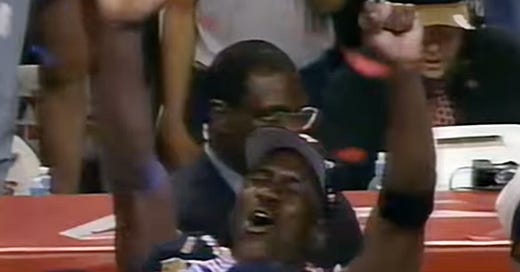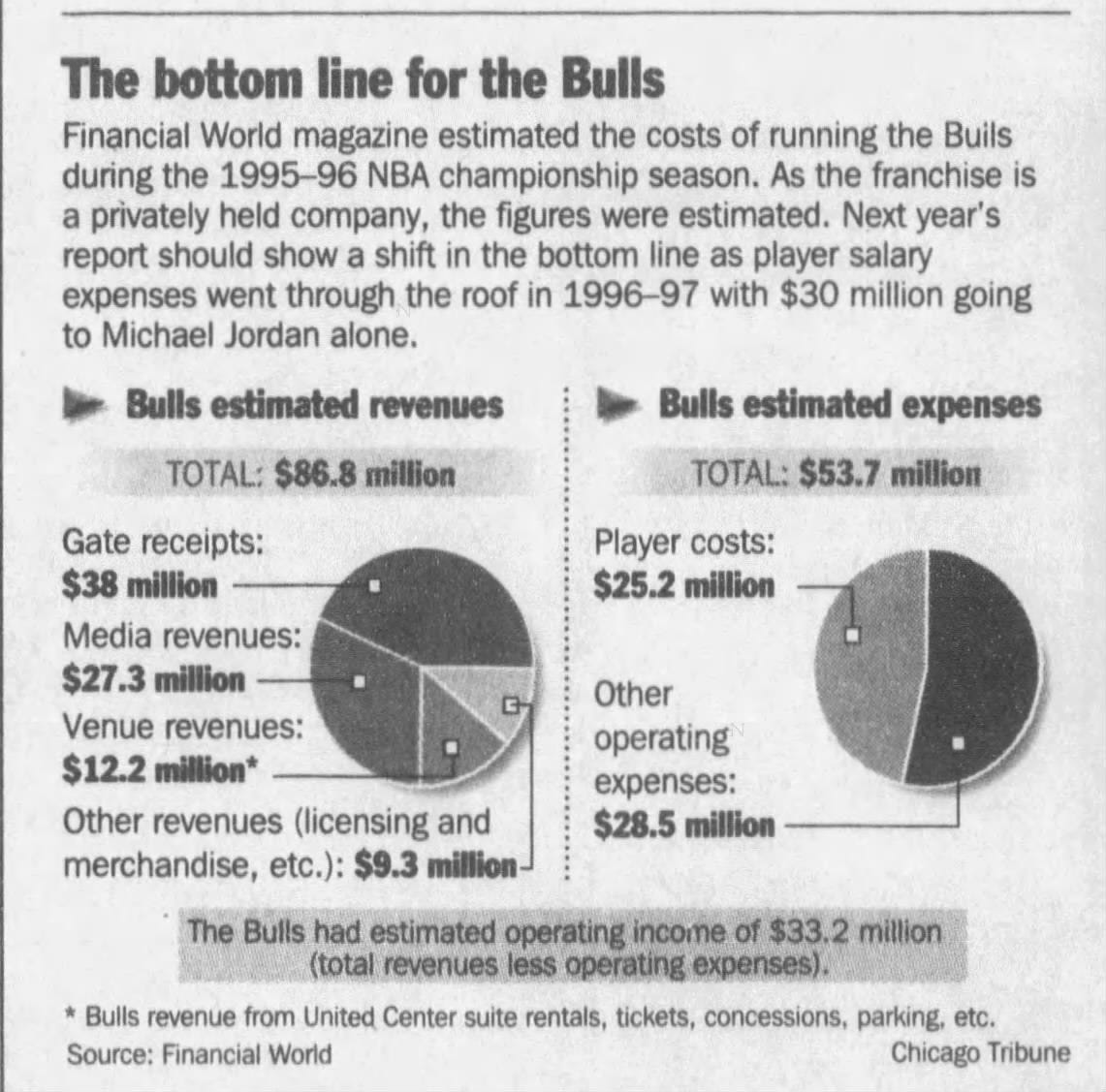
Sometimes I scoff at efficiency.
I decline optimization. I refuse to be streamlined. I want to run and play and fail and feel. I want to be human more than I want to be perfect.
In business, yes, efficiency matters. You have to know your numbers. You have to make hard choices.
But art leads with humanity. It honors the muse. It is its own justification. You must honor art on its own terms. That includes the art in competition. The art in sports. And on June 13, 1997, Michael Jordan was wondering whether his bosses would evaluate his team’s value more through the lens of art or the lens of business.
“For once, don’t look at the bottom line,” Jordan said after the game. “Look at the joy of this night and every night that we won a championship and the joy that you put together: an unbelievable organization that’s been champions for five out of seven years.”
Michael once said that part of his power was his ability to be present. He could stay in the moment, whether late in a game or reflecting on the gift of being part of a sustained championship team. That’s what I love about his press conference here — you can tell that the moment left him completely fulfilled.
That’s different than being satisfied, meaning content. I doubt he was ever competitively content.1 But at least when he won the last game of the season, he was competitively satiated. He made sure to enjoy it. He knew what a championship meant. He appreciated every inch of being a champion, playing with his teammates, being guided by his coaches. He stayed in the moment.
Check the question starting at 7:21 below, and Jordan’s full response. In a world that often seems to live in a state of emotional transience, perpetually wiping the hard drive clean, Jordan’s post-title zen is a vibe to live by.
Reporter question: “In the wake of this incredible celebration, there will be some very difficult business decisions for Jerry Reinsdorf.”2
Michael Jordan: (Agreeing) “Sure.”
Reporter: “Can you please, to your best ability, lay out the scenario that you would like to see unfold and the one that you expect to unfold because of money considerations, particularly involving Scottie Pippen’s contract.”
Michael Jordan:
You want me to be GM, I guess. Take Jerry Krause’s position. (Laughter in crowd.) I think this team is entitled to an opportunity to continue to be successful. Sure business has got to come involved. I’m not saying Jerry Reinsdorf is the richest guy in the world. I’m not saying all his partners can financially support what this team needs to maintain and be successful. But we’ve done a lot for this organization and we put it in a situation where it could be highly valuable.
When I first came here, and I’m pretty sure everybody can tell you, that the Bulls team was worth probably $13 million? Fifteen, $16, $17 million?3 Now it’s worth $150 million.4 So the profit has been made over the years. What we gain now in trying to keep this team together and be successful, we paid for over six, seven, eight, ten years.
That has to have some consideration, some sense of loyalty, you know, to myself, to Scottie, to Phil. Even to the guys who have given themselves over the last two years. Or even Dennis, with all the different colors that he may wear in his hair or his dresses or whatever.
We’re entitled to defend what we have until we lose it. If we lose it, then you look at it and you say, okay, let’s change. Let’s go through a rebuilding. No one’s guaranteeing rebuilding is going to be two or three, four, five years. The Cubs have been rebuilding for 42 years.5 (Laughter.) And that’s something that you have to look at from a business aspect.
So, if you want to look at this from a business thing, have a sense of respect for the people who have laid the groundwork so that you can be a profitable organization. And I’m not trying to twist Jerry Reinsdorf’s arm. It sounds like it though. (Laughter.) But I’d like to see us defend what we have attained over the last five out of seven years, which is a championship team. And I don’t know what it’s going to take. Maybe he has to mortgage his home, or leverage the team against whatever bank notes that he may have.
But I think we are entitled to defend what we have. And Phil should be the head coach. And I shouldn’t be put in a position to have to make a choice to play for another coach other than Phil Jackson. Simple as that. You know I, sadly as it may be, I have choices. And I will not choose to play for another coach. I chose to play for Phil Jackson and to finish Scottie Pippen’s contract out and let him have an opportunity to have the same type of choices — because he’s earned it, and I’ve earned it, and the City of Chicago has earned it.
For years we’ve been, “Wait till next year. Wait till next year.” Now we’re five out seven years champions. That means a lot. For once, don’t look at the bottom line. Look at the joy of this night and every night that we won a championship and the joy that you put together: an unbelievable organization that’s been champions for five out of seven years.

Postscript:
About a week after the ‘97 Finals, the Tribune ran a deep dive on all Bulls economic matters, including data from Financial World magazine on the team’s revenue and expenses. The magazine estimated that in the 1995-96 season, the club brought in $86.8 million against $53.7 million expenses.
That figure included player salaries at $25.2 million, meaning expenses rose dramatically for 1997, as Jordan’s salary alone jumped from $4 million to $30 million. This was the nature of the financial squeeze that ownership was feeling, and after coming eyeball to eyeball with breaking up the team, Jerry Reinsdorf and Jerry Krause went all in one more time, re-signing everyone.
“After sitting down with Michael, it was quite evident in our conversation that both of us continue to care very deeply the Bulls’ organization, its fans and where the franchise is headed,” Reinsdorf said after signing Jordan to a new one-year record contract of $33 million. “That made Tuesday’s decision easy.”
“Jerry and I have a special relationship which enables us to work cooperatively,” Jordan said. “I am committed to Chicago and winning — so is Jerry.”
And so it was that for one more season, even with its hardships, they chose joy.
Free agents included Jordan, who was on a one-year deal for $30 million, Rodman and Phil Jackson, with Scottie Pippen entering the final year of his contract, making him potential trade bait. The question facing Reinsdorf and Krause was whether to try to do a full reset after 1997 by trading Pippen, which they nearly did a few weeks later.
When Jerry Reinsdorf and his group bought controlling interest in the Bulls in February 1985, the team was worth a little over $16 million, based on Tribune reporting. By the end of the dynasty, the Bulls were the most valuable team in the NBA at $303 million.
MJ might have been low here. The June 1997 Tribune story on the state of the Bulls’ value noted that “most sports economists” estimated that if placed on the open market, the Bulls franchise could fetch $180-$225 million. Reinsdorf said that all estimates he’s seen are “way off” because the Bulls were not a “standalone business” but rather something that would have to be considered alongside his holdings in the United Center and even the White Sox.
I love this line :) — that said, he was off by 10 years. 1945 + 52 = 1997. All good!






You have a truly infectious writing style. I also enjoy how you do so good at capturing the moment from years ago. I'm truly fascinated by how you developed your craft.
"We’re entitled to defend what we have until we lose it" is a great line. still makes me feel things